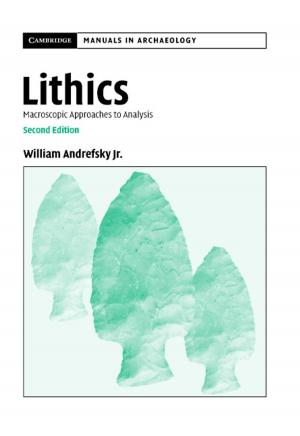Women, Work, and Clothes in the Eighteenth-Century Novel
Fiction & Literature, Literary Theory & Criticism, British, Nonfiction, Social & Cultural Studies, Social Science| Author: | Chloe Wigston Smith | ISBN: | 9781107272637 |
| Publisher: | Cambridge University Press | Publication: | June 13, 2013 |
| Imprint: | Cambridge University Press | Language: | English |
| Author: | Chloe Wigston Smith |
| ISBN: | 9781107272637 |
| Publisher: | Cambridge University Press |
| Publication: | June 13, 2013 |
| Imprint: | Cambridge University Press |
| Language: | English |
This groundbreaking study examines the vexed and unstable relations between the eighteenth-century novel and the material world. Rather than exploring dress's transformative potential, it charts the novel's vibrant engagement with ordinary clothes in its bid to establish new ways of articulating identity and market itself as a durable genre. In a world in which print culture and textile manufacturing traded technologies, and paper was made of rags, the novel, by contrast, resisted the rhetorical and aesthetic links between dress and expression, style and sentiment. Chloe Wigston Smith shows how fiction exploited women's work with clothing - through stealing, sex work, service, stitching, and the stage - in order to revise and reshape material culture within its pages. Her book explores a diverse group of authors, including Jane Barker, Jonathan Swift, Daniel Defoe, Eliza Haywood, Samuel Richardson, Henry Fielding, Charlotte Lennox, John Cleland, Frances Burney and Mary Robinson.
This groundbreaking study examines the vexed and unstable relations between the eighteenth-century novel and the material world. Rather than exploring dress's transformative potential, it charts the novel's vibrant engagement with ordinary clothes in its bid to establish new ways of articulating identity and market itself as a durable genre. In a world in which print culture and textile manufacturing traded technologies, and paper was made of rags, the novel, by contrast, resisted the rhetorical and aesthetic links between dress and expression, style and sentiment. Chloe Wigston Smith shows how fiction exploited women's work with clothing - through stealing, sex work, service, stitching, and the stage - in order to revise and reshape material culture within its pages. Her book explores a diverse group of authors, including Jane Barker, Jonathan Swift, Daniel Defoe, Eliza Haywood, Samuel Richardson, Henry Fielding, Charlotte Lennox, John Cleland, Frances Burney and Mary Robinson.















